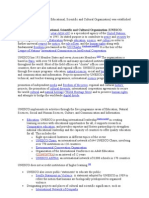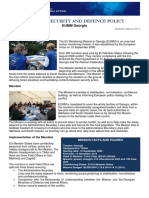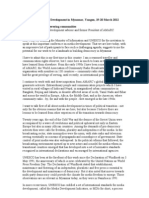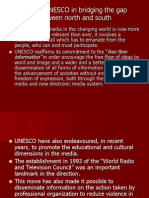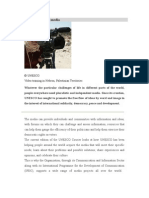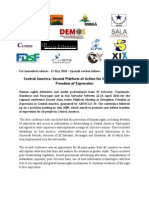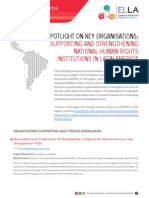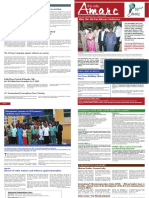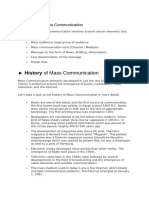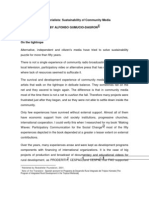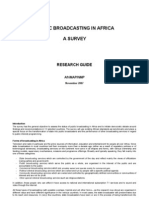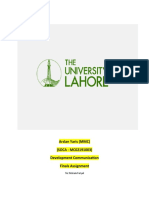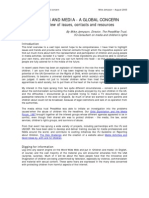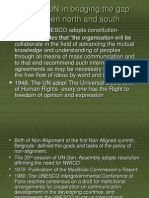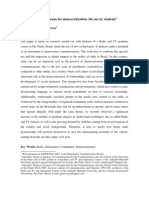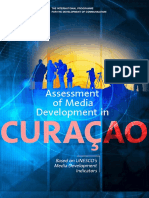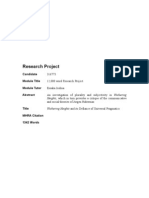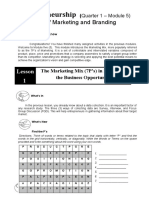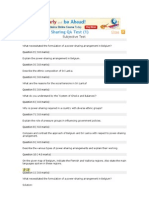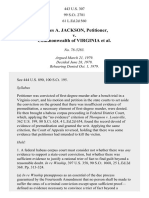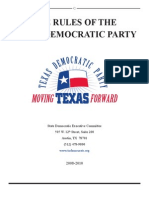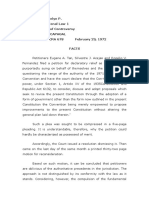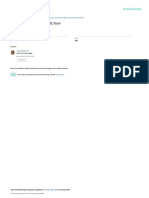Communication and Information Sector Cooperation With Peru DG's Visit To Peru February 2011
Communication and Information Sector Cooperation With Peru DG's Visit To Peru February 2011
Uploaded by
agamonalCopyright:
Available Formats
Communication and Information Sector Cooperation With Peru DG's Visit To Peru February 2011
Communication and Information Sector Cooperation With Peru DG's Visit To Peru February 2011
Uploaded by
agamonalOriginal Title
Copyright
Available Formats
Share this document
Did you find this document useful?
Is this content inappropriate?
Copyright:
Available Formats
Communication and Information Sector Cooperation With Peru DG's Visit To Peru February 2011
Communication and Information Sector Cooperation With Peru DG's Visit To Peru February 2011
Uploaded by
agamonalCopyright:
Available Formats
Communication and Information Sector Cooperation with Peru DGs visit to Peru February 2011
CI Information Division 1. Memory of the World Programme Following an awareness-raising workshop in Lima in October 2010 to familiarize Peruvian documentary heritage institutions with the Memory of the World Programme and its objectives, there was agreement that a MoW national committee should be created to further the work within the country. The committee has since been established. 2. Peruvian items inscribed in the MOW Register: Year of submission: 2007 Year of inscription: 2007 Link to Nomination Form Country: Bolivia Colombia Mexico Peru The documentary collections of music from the 16th to the 18th century from different countries of the American continent are an essential part of the cultural history of the New World in all aspects: religious and lay, civil and political, cultural and popular, vocal and instrumental, mystic and dramatic, renaissance, baroque and classic. They constitute the testimony of different cultures (Indigenous, African and European) which mixed and gave birth, to a new culture, not completely western, nor Hispanic, nor purely American, for three centuries. UNESCO Quito Office Projects and activities recently implemented in Peru Main line of action 1: Promoting freedom of expression and access to information Regular Programme
1. With the support of UNESCO, FUNDAMEDIOS organized the First Andean
Conference on Freedom of Expression (Quito, 24-25 October 2008) with the objective of analyzing the situation of freedom of expression in the Andean sub-region, reviewing monitoring mechanisms and defining a joint plan of action with NGOs working on FEX issues in the sub-region. The Press and Society Institute (IPYS) represented Peru at the meeting and participated in the implementation of follow-up activities.
2. The book Right to Information in Latin America: A Comparative Legal
Survey", written by Canadian consultant Toby Mendel, was coordinated and published by UNESCO/Quito. It was distributed throughout the region, including in Peru. The study offered a legal analysis about the right to information in Latin America, by comparing the laws in force in 11 Latin American countries: Chile, Colombia, Ecuador, Guatemala, Honduras, Mexico, Nicaragua, Panama, Peru, Dominican Republic and Uruguay. This document helps to clarify some of the tensions and challenges concerning FOI laws from a regional comparative perspective. Besides, it describes the way in which these countries have handled the passing of FOI laws and underlines their strengths and weaknesses.
3. Within
the framework of sub-regional initiatives organized to commemorate World Press Freedom Day (WPFD), the UNESCOQuito office implemented several activities to strengthen press freedom and the right to information in the sub-region, including in Peru, such as: a website dedicated to World Press Freedom Day, 14 awareness-raising conferences on press freedom issues, a press kit for the media (see graph on press coverage in Peru), educational activities and materials for secondary schools, and a comic book on freedom of expression principles that is being distributed throughout the region.
Main line of action 2: Strengthening free, independent and pluralistic media and communication for sustainable development Regular Programme
1. In collaboration with the University of the Sabana, the First IberianAmerican Meeting of Research Networks in Audiovisual Communication
and Journalism was organized in Bogota on 30 September-3 October 2008. Its purpose was to update media owners and directors, journalists, professors and researchers in subjects such as public access to information, journalistic practices, the impact of economic interests on the quality of journalism, and media speech as builder of public opinion. Around 150 Iberian-American participants were trained on concrete ways of improving the quality of the information they deliver to their audiences. The meeting was attended by Peruvian journalists.
2. Project Mapping of Communication and Journalism Training Centres in
Latin America and the Caribbean was implemented in collaboration with the Federation of Latin American Communication Faculties (FELAFACS), whose secretariat was until recently based in the University of Lima (Peru). It created a map of communication and journalism training institutions in Latin America, and their respective programmes, and identified models of quality accreditation of communication and journalism programmes in Latin America. As a result, an updated data base of educational institutions in each country (including contact professors, pre-graduate and post-graduate programmes, number of students and professors, certifications and degrees offered, etc) is now available. This study also serves as a basis for CIs current Center of Excellence development programme in the region.
3. Projects All radios in the Web and Manual on ICTs for Radio Dummies,
were implemented in collaboration with the NGO Radialistas Apasionadas y Apasionados. The objective of the former was to offer Web hosting and services as well as virtual training to Latin American and Caribbean community radios. The latter led to the publication by UNESCO/Quito, UNESCO/Montevideo and UNESCO/San Jose of a manual for the setting up, maintenance and management of radio stations using modern ICTs. As a second phase of this initiative, a series of training workshops are currently being organized in the region in order to make use of the Manuals contents. The Manual has been distributed to Peruvian community radio stations.
4.
Updating and re-publishing eight Training manuals for radio communicators, addressed to Latin American countries,
including Peru, on subjects related to producing community-related news, conducting interviews, producing radio magazines, developing participation platforms for citizens, etc. This project was carried out by the Latin American Association of Radio Education (ALER).
International Programme for the Development of Communication (IPDC)
1. Project Human Rights in Latin America and the Caribbean, was
implemented by the World Association of Community Radios-Latin America and the Caribbean (AMARC-ALC). It allowed community journalists to receive training on Human Rights and journalistic production and join the Plsars correspondent network. The project involved Peruvian community journalists.
2. The Latin American Association for Radio Education (ALER) carried out the
project Radio journalism 2.0 for the understanding and exercise of the right to information, developing skills of media practitioners to enable them to utilize ICTs to strengthen their journalistic practices. The project included Peruvian trainees.
3. Radio Oriente de Yurimaguas implemented the project Red Radial
Amaznica, addressed to four ethnic groups of Peru who work in six radio stations. The main objective was to raise awareness of the rights and concerns of excluded sectors, especially of native communities, foster dialogue between political and social actors and contribute to the design, implementation and monitoring of local and regional policies. 4. TV Cultura (Peru) organized an itinerant training programme in which the trainers travelled and joined the production team of each participating community TV channel while producing a wellknown national news programme. This mechanism allowed to improve production quality on the spot and had an impact on the entire information structure of the channel. Thirty journalists and 45 technicians were trained. A manual on news production was printed and is available on CD-ROM.
The Consejo de la Prensa Peruana (CPP) of Peru (the organization that
5.
gathers Peruvian media owners) is presently finishing the implementation of project Media, ethics and democracy, with the objective of promoting ethics in journalism as a means to strengthen the role of independent media, enhancing government transparency, reinforcing freedom of expression values and ultimately contributing towards the consolidation of democracy in Peru. The target group consisted of 60 journalists and 30 media owners in the Cusco and Ica regions of Peru who work in over 35 urban and rural media and information outlets. They were trained in issues such as: transparency, ethics and press coverage of corruption; social responsibility and ethics in the press; understanding legislation and ethics, including legal implications of the use of air waves; advertising and independence.
6. The regional project Strengthening democracy by promoting investigative
journalism and transparent access to public information, being implemented by Instituto Prensa y Sociedad (IPYS) of Peru, aims to train journalists who work for private and community-based media in poor regions of Peru and Ecuador in investigative journalism and the application of digital tools to strengthen their research and coverage of public issues. The objective is to improve the quality of the information and thus strengthen the publics capacity to monitor and participate in public issues. The project will contribute to building the capacity of journalists to inform professionally about the issues that affect the poorest members of society, while fighting the culture of secrecy.
7. Through project Strengthening media as a platform for democratic
discourse through training and application of Web 2.0/3.0 ICT tools, the Latin American Information Agency (ALAI) wishes to respond to the need of marginalized social groups to exercise their right to freedom of expression by making their viewpoints known to the rest of society and participate in democratic processes at local, national and regional levels. The methodology to be used will promote greater synergy and exchange among alternative media in the region. It combines a seminar, an on-line training course and a follow-up evaluation process to reflect on these issues and develop networking mechanisms, using Web 2.0 tools, and exploring Web 3.0 options. Peruvian trainees are participating in the training programme.
8. The Center for Studies on Freedom of Expression and Access to Information (CELE) of the University of Palermo (Argentina) and the UNESCO Office in Quito organized a meeting of organizations of the Andean Group of Freedom of Information (GALI) in order to evaluate the mechanisms being currently used to monitor violations of freedom of expression in the region. The meeting focused on analyzing the sources of information and research being used, and explored how new technology platforms may improve the scope and accuracy of the registration processes, the dissemination of alerts and the indicators and statistics produced by the monitoring system. This activity was organized within the framework of IPDCs regional project Strengthening monitoring of Freedom of Expression in the Andean region and was attended by the Press and Society Institute (Instituto Prensa y Sociedad, IPYS) of Peru. In July 2011 there will be a second meeting of the GALI organizations in order to assess progress and / or problems encountered during that period. The scope of the new monitoring system will then be finally decided, as well as the strategies to be implemented to improve the current mechanisms.
9. Two new project proposals involving Peruvian institutions were submitted
to IPDC in 2011: PERU: Empowering community reporters for the production of documentary media, submitted by the Peruvian Documentary Association (DOCUPERU) for an amount of $ 36.000 REGIONAL: Strengthening community media as a Platform for Democratic discourse by training in ICTs and gender for women journalists, submitted by the ILLA Education and Communication Center, in Lima, Peru for an amount of US$ 38,275
Main line of action 3: Fostering universal access to information and knowledge and the development of infostructures Regular Programme 1. UNESCO-Quito is currently developing the terms of reference of a joint initiative with the Trust of the Americas of the Organization of American States (OEA) in order to evaluate the situation of handicapped people in the Andean region (including Peru) in terms of access to Information and use of ICTs (including in formal and non-formal education). The evaluation will allow formulating an action plan with the aim of eliminating current barriers to access information.
2. Through a joint initiative of the CI and ED Sectors of UNESCO-Quito, project
New teachers, new technologies aims at building a pedagogical proposal
for the appropriation of ICTs and digital literacy in the undergraduate programmes for secondary-school teachers in the Andean countries (including Peru). The proposal will include a mapping of pioneer experiences, specialized institutions and experts in the sub-region; a combined on-line/face-to-face training module incorporating the use of ICTs in teacher training; and the implementation of the module by a group of participating institutions in the Andean countries and according to each countrys particular needs.
3. The Peruvian National Commission was invited to a training session
organized by UNESCO/Quito in preparation of 36 C/5 prior to the regional consultation meeting organized in Trinidad and Tobago in July 2010.
Information for All Programme (IFAP)
With extra-budgetary funding provided by the government of Spain (US$600,000), Project E-government Model for World Heritage Cities; Cartagena de Indias (Colombia), Cusco (Peru), and Quito (Ecuador) was implemented in 20062008. It aimed at promoting e-governance in three world heritage cities in the Andean sub-region. The project provided training to 1,000 public officers responsible for the processing and management of public information. On the other hand, it promoted the participation of citizens by training more than 2,000 members of communities in the use of ICTs for information search. Finally, the project equipped the three cities with 20 public-access points where citizens can easily use e-government services and look for information. A second phase for this project was approved by Spain (US$164,000) in 2010. As a first step, UNESCO will actively promote the use in Peru of the materials developed within the framework of the first phase of project, particularly the Multimedia training programme for secondary schools, which introduces the concepts of citizens participation, human rights and e-governance to teenagers.
You might also like
- Barangay Blotter 1Document2 pagesBarangay Blotter 1Maria Josefa Clarion90% (10)
- Mario Kaplun y O'Sullivan Informe A La UNESCODocument162 pagesMario Kaplun y O'Sullivan Informe A La UNESCOFernando Korstanje100% (1)
- UNESCODocument3 pagesUNESCOThe Tun 91No ratings yet
- Media Practices and Changing African Socialities: Non-media-centric PerspectivesFrom EverandMedia Practices and Changing African Socialities: Non-media-centric PerspectivesJo Helle-ValleNo ratings yet
- All About Debate CompetitionDocument4 pagesAll About Debate CompetitionDimar Ya Marjan0% (1)
- Common Security and Defence Policy: EUMM GeorgiaDocument2 pagesCommon Security and Defence Policy: EUMM GeorgiaUrucNo ratings yet
- Criminal Law MCQ QuestionsDocument2 pagesCriminal Law MCQ QuestionsJenz Paul100% (1)
- Media Literacy QuestionaireDocument8 pagesMedia Literacy QuestionaireJobi BesicNo ratings yet
- Definition Development CommunicationDocument10 pagesDefinition Development Communicationsudeshna86No ratings yet
- Milid Yearbook 2015-249-256Document9 pagesMilid Yearbook 2015-249-256vg5n6yh89vNo ratings yet
- A Study of Select Radio Drama Programmes On Broadcasting CoporationDocument46 pagesA Study of Select Radio Drama Programmes On Broadcasting CoporationDaniel ObasiNo ratings yet
- Meeting Report: The Launch of A Thematic Study On Indigenous Peoples and The MediaDocument11 pagesMeeting Report: The Launch of A Thematic Study On Indigenous Peoples and The MediaMirasol SumerbangNo ratings yet
- p2p Leaflet enDocument2 pagesp2p Leaflet enMargarita IoannidouNo ratings yet
- Presentation - Yangon 19-03-12Document3 pagesPresentation - Yangon 19-03-12Steve BuckleyNo ratings yet
- AMARCnewsletter Dec2014 enDocument6 pagesAMARCnewsletter Dec2014 enAMARC - Association mondiale des radiodiffuseurs communautairesNo ratings yet
- Role of UNESCO in Bridging The Gap BetweenDocument8 pagesRole of UNESCO in Bridging The Gap BetweenDEEPAK GROVER100% (1)
- Indigenous Community Media: Creating An Enabling Environment For Free and IndependentDocument5 pagesIndigenous Community Media: Creating An Enabling Environment For Free and IndependentMirasol SumerbangNo ratings yet
- Open Your EyesDocument7 pagesOpen Your EyesOana BotezanNo ratings yet
- Educating For The Media and The Digital AgeDocument3 pagesEducating For The Media and The Digital Agerahadian p. paramitaNo ratings yet
- The Power of The MediaDocument4 pagesThe Power of The MediaPatríciaNo ratings yet
- Lesson 2 Learning With The CampesinosDocument19 pagesLesson 2 Learning With The CampesinosJoshua Carl MitreNo ratings yet
- Mapping of Media Literacy Practices and Actions in EU-28Document458 pagesMapping of Media Literacy Practices and Actions in EU-28jromerosanchezpsNo ratings yet
- Contributions of UNESCODocument11 pagesContributions of UNESCOJiro KyokaNo ratings yet
- Communication Research TrendsDocument44 pagesCommunication Research TrendsAgustinus Rusdianto BertoNo ratings yet
- Central America Second Platform of Action For Strengthening Freedom of ExpresionDocument6 pagesCentral America Second Platform of Action For Strengthening Freedom of ExpresionarticlexNo ratings yet
- Roles of Broadcasting To National DevelopmentDocument2 pagesRoles of Broadcasting To National DevelopmentMichael InnocentNo ratings yet
- SPOTLIGHT ON ORGANISATIONS: Key Organisations Supporting and Strengthening National Human Rights Institutions in Latin AmericaDocument3 pagesSPOTLIGHT ON ORGANISATIONS: Key Organisations Supporting and Strengthening National Human Rights Institutions in Latin AmericaELLA ProgrammeNo ratings yet
- Plan of The Homeland Regarding Information Technology and TechnologyDocument15 pagesPlan of The Homeland Regarding Information Technology and TechnologyScribdTranslationsNo ratings yet
- Community RadioDocument10 pagesCommunity RadiosrivastavamukulNo ratings yet
- Working PaperDocument3 pagesWorking PaperDiana RotaruNo ratings yet
- NewsletterAMARCAfrica No3 enDocument5 pagesNewsletterAMARCAfrica No3 enAMARC - Association mondiale des radiodiffuseurs communautairesNo ratings yet
- NewsletterAMARCAfrica No1 enDocument2 pagesNewsletterAMARCAfrica No1 enAMARC - Association mondiale des radiodiffuseurs communautairesNo ratings yet
- Bilateral Multilateral and Regional Information Co OperationsDocument11 pagesBilateral Multilateral and Regional Information Co OperationsDEEPAK GROVERNo ratings yet
- Knowledge and Peoples Power1Document131 pagesKnowledge and Peoples Power1dominicNo ratings yet
- Legacy Media Reloaded An IntroductionDocument5 pagesLegacy Media Reloaded An IntroductionMaria ChiaraNo ratings yet
- Media Diversity Next Steps enDocument27 pagesMedia Diversity Next Steps enMaëlenn DrévalNo ratings yet
- Fez Declaration On Media and Information LiteracyDocument2 pagesFez Declaration On Media and Information LiteracyPaulo Alexandre TeixeiraNo ratings yet
- Mass CommunicationDocument4 pagesMass CommunicationTshepoNo ratings yet
- Art of Lists (Gumucio)Document25 pagesArt of Lists (Gumucio)Alfonso Gumucio DagronNo ratings yet
- Community Radio - UpdatedDocument9 pagesCommunity Radio - Updatedmfx.fileuploadNo ratings yet
- Samy Tayie UnescoDocument5 pagesSamy Tayie UnescoMichael KitNo ratings yet
- Media Info ReviewerDocument12 pagesMedia Info ReviewerripleysociNo ratings yet
- Press Freedom and Pluralism in Europe: Concepts and ConditionsFrom EverandPress Freedom and Pluralism in Europe: Concepts and ConditionsNo ratings yet
- Alfonso Gumucio - CV 2008 03Document14 pagesAlfonso Gumucio - CV 2008 03roddocsNo ratings yet
- Prime-Time, The Week-Ends, Etc.-, As Well As The Contribution of Every TV Channel To The DiversityDocument24 pagesPrime-Time, The Week-Ends, Etc.-, As Well As The Contribution of Every TV Channel To The DiversityestovallesNo ratings yet
- History Project Icse ProjectDocument19 pagesHistory Project Icse ProjectdrishtikotwaniNo ratings yet
- Journalists To Journalists Eng PDFDocument96 pagesJournalists To Journalists Eng PDFEmilia SercanNo ratings yet
- Forms of MediaDocument4 pagesForms of MediaCathy SabladaNo ratings yet
- Research Guide For Survey of Public Broadcasting in Africa (AfriMAP 2007)Document31 pagesResearch Guide For Survey of Public Broadcasting in Africa (AfriMAP 2007)OSFJournalismNo ratings yet
- Share Arslan Yaris (M-WPS OfficeDocument10 pagesShare Arslan Yaris (M-WPS OfficeArslan YarisNo ratings yet
- Children and MediaDocument7 pagesChildren and Media'Alia N. AmranNo ratings yet
- Yes, The Ideas of The Macbride Report Are Still Current: Patricio TupperDocument3 pagesYes, The Ideas of The Macbride Report Are Still Current: Patricio TupperVidhi BubnaNo ratings yet
- Social Media, Accountability, and Public TransparencyDocument46 pagesSocial Media, Accountability, and Public TransparencyUNDP in Europe and Central AsiaNo ratings yet
- Role of UNDocument13 pagesRole of UNDEEPAK GROVERNo ratings yet
- Development CommunicationDocument8 pagesDevelopment CommunicationJbt Skylight100% (1)
- Radio As Means For Democratization (IAMCR - 2007)Document16 pagesRadio As Means For Democratization (IAMCR - 2007)Gisele Sayeg100% (1)
- CW Module 7Document15 pagesCW Module 7arln mndzNo ratings yet
- UNESCO Rapport Media Curacao 2016Document242 pagesUNESCO Rapport Media Curacao 2016Knipselkrant CuracaoNo ratings yet
- Mass Media NotesDocument36 pagesMass Media NotesTariq Hussain83% (6)
- Digital Single MarketDocument4 pagesDigital Single MarketCătălin TulucNo ratings yet
- Chapter 8Document8 pagesChapter 8Jommy Mark ObinaNo ratings yet
- Module 4Document60 pagesModule 4Dexther JalitNo ratings yet
- Final Report Avina-21febDocument18 pagesFinal Report Avina-21febarmado421No ratings yet
- Wuthering Heights and Its Defiance of Universal PragmaticsDocument61 pagesWuthering Heights and Its Defiance of Universal PragmaticsDavid JonesNo ratings yet
- People Vs LimacoDocument6 pagesPeople Vs LimacoClaudia LapazNo ratings yet
- Entrepreneurship: 7 P's of Marketing and BrandingDocument9 pagesEntrepreneurship: 7 P's of Marketing and BrandingEddie PagalanNo ratings yet
- HUMAN RIGHTS EssayDocument11 pagesHUMAN RIGHTS EssayjaveriaNo ratings yet
- Power Sharing QA TestDocument5 pagesPower Sharing QA TestPriya MahadevNo ratings yet
- 8 Constantino vs. People GR No. 225696 4 8 2019Document15 pages8 Constantino vs. People GR No. 225696 4 8 2019Rochelle GablinesNo ratings yet
- Jackson v. Virginia, 443 U.S. 307 (1979)Document27 pagesJackson v. Virginia, 443 U.S. 307 (1979)Scribd Government DocsNo ratings yet
- Texas Democratic Party (TDP) RulesDocument55 pagesTexas Democratic Party (TDP) RulestexbarnesNo ratings yet
- Billet Application MLDocument1 pageBillet Application MLTodd HandspikerNo ratings yet
- Article III Bill of Rights Sec 21Document7 pagesArticle III Bill of Rights Sec 21Celestiono_122321No ratings yet
- TC-01 (P)Document25 pagesTC-01 (P)Ravi GuptaNo ratings yet
- Tan Vs MacapagalDocument3 pagesTan Vs MacapagalRmLyn Mclnao50% (2)
- India Legal 30 September 2015Document84 pagesIndia Legal 30 September 2015Patil VijayNo ratings yet
- Letter To COG-Special Message To The Council of GovernorsDocument5 pagesLetter To COG-Special Message To The Council of GovernorsInternational Center for Policy and ConflictNo ratings yet
- Human Rights Alert: 1. General DetailsDocument79 pagesHuman Rights Alert: 1. General DetailsHuman Rights Alert - NGO (RA)No ratings yet
- Resume Daniel RothierDocument6 pagesResume Daniel RothierAndrew BredonNo ratings yet
- Manager or Corporate SecurityDocument2 pagesManager or Corporate Securityapi-121417524No ratings yet
- Parole Hearing Fact SheetDocument3 pagesParole Hearing Fact SheetKristen NicoleNo ratings yet
- NEWSREPORTINGGUIDENewDocument87 pagesNEWSREPORTINGGUIDENewRameshNo ratings yet
- Example Basic Agenda W Roberts Rules SummaryDocument2 pagesExample Basic Agenda W Roberts Rules SummaryMarcy MillerNo ratings yet
- Complaint Gloria OngDocument3 pagesComplaint Gloria OngPitongDeAsisNo ratings yet
- T-PD (2018) 15 - Case Law On Data Protection - May2018 - en PDFDocument309 pagesT-PD (2018) 15 - Case Law On Data Protection - May2018 - en PDFcontenciosoNo ratings yet
- Cebu Seaman's Assoc V Ferrer-Calleja Case DigestDocument3 pagesCebu Seaman's Assoc V Ferrer-Calleja Case DigestMelody Lim DayagNo ratings yet
- R.A. 9262 Violence Against Women and Children With I.R.R.Document99 pagesR.A. 9262 Violence Against Women and Children With I.R.R.Dilbert Spine100% (8)
- Summary The Tragedy of American Diplomacy PDFDocument4 pagesSummary The Tragedy of American Diplomacy PDFRaphaelRicaudNo ratings yet
- Supreme CourtDocument5 pagesSupreme CourtAngelina Villaver ReojaNo ratings yet


